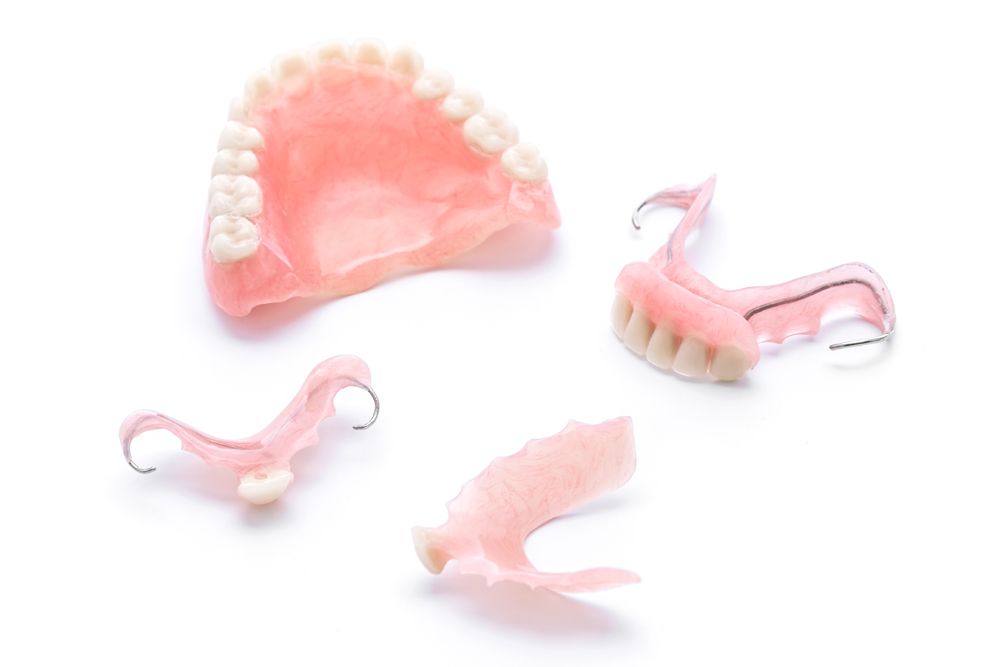Partial Dentures
Tooth loss can impact your dental function and your self-esteem, leaving noticeable gaps in your smile. If you lose several teeth in more than one area, a partial denture can restore your ability to eat, speak, and smile with ease. Partial dentures can either be removable or implant-retained. Removable restorations consist of artificial teeth attached to a gum-colored base, as well as small metal clasps that grip adjacent teeth. Implant-supported restorations are affixed to dental implants embedded in the jawbone and offer superior stability and aesthetics.
Determining Candidacy
With several types of partial dentures available, these restorations offer patients with varying needs the ability to restore their smile.
You may be a candidate for a partial denture if you have extensive tooth loss, but still have one or more healthy teeth remaining in the upper or lower jaw. To qualify for implant-retained restorations, you must have sufficient bone density and volume to support implant posts. In the case that your bone has degenerated at the site of a missing tooth, you may require a preliminary bone graft or sinus lift to restore your candidacy.
Partial Dentures vs. Complete Dentures
Whereas partial dentures replace multiple missing teeth, full dentures can restore an entire dental arch. Full dentures can be removable or fixed. They can either be supported by dental implants or secured to the gums using suction or adhesion.

Partial dentures can replace a few or several missing teeth.
Types of Partial Dentures
There are several types of partial dentures available. To determine the best type for you, your dentist will examine the health of your smile and review your goals, lifestyle, and budget.
Cast Metal Removable Partial Denture
The most common partial denture, this removable prosthetic consists of a gum-colored acrylic base and artificial teeth. Small metal clasps attach this denture to neighboring teeth. These restorations are created using metal castings and a cold-pour process. They are custom-crafted for each patient and offer comfort and security.
Acrylic Removable Partial Denture
An acrylic removable partial denture, also known as a “flipper,” is a more economical prosthesis. This device features replacement teeth set in a gum-colored acrylic base, as well as small metal clasps that attach to natural teeth. These are typically considered a provisional solution, as they are bulkier and less durable than cast metal removable partials.
Flexible Partial Denture
For patients who have a metal allergy or find cast metal and acrylic partial dentures uncomfortable, flexible partial dentures may be a better option. These prosthetics are made from thin, thermoplastic nylon resin. Rather than metal clasps, the prosthesis features tooth-colored clasps that blend with neighboring teeth. Though flexible partials have a higher price point, they are both strong and aesthetically pleasing.
Implant-Supported Partial Denture
If you are ready to invest in a more permanent solution, you may wish to consider implant-supported partial dentures. These restorations are anchored directly into your jawbone with dental implants. Implant posts become a permanent part of your anatomy and provide unrivaled support for restorations. As a result, you will never have to worry about your denture slipping out of place. Implants also promote long-term oral health, helping to preserve the strength and structure of your smile. With proper care, restorations can last for many years, and implants can last a lifetime.
What to Expect during Treatment
During the initial consultation, your dentist may request x-rays of your smile to determine the health of your jawbone and any remaining teeth. If your dentist detects any underlying issues such as cavities or gum disease, these will need to be addressed prior to receiving your denture.
If you select a removable partial denture, the dentist will take impressions of your teeth. These molds are sent to a laboratory, where your denture will be fabricated over a two to four week period.. Once complete, the dentist can secure the restoration to adjacent teeth and ensure it fits properly and comfortably.
The process of receiving an implant-supported partial denture takes several months, as patients must first undergo dental implant surgery. After a three to six month healing period, the dentist can affix a custom restoration to the implant posts.
Caring for Partial Dentures
To extend the longevity of your removable partial denture, you should:
- Clean the partial denture nightly using gentle techniques. Remove the denture from your mouth and rinse off any debris. Using a soft-bristled toothbrush and specialized cleaner, gently clean the device. Remember to avoid using toothpaste, as it can cause permanent damage. Denture cleansers with the American Dental Association Seal of Acceptance are safe to use.
- Avoid holding the partial over tile floor or the sink. Because your partial denture is delicate, make sure to hold the denture over a folded towel or soft surface when cleaning.
- Keep your partial denture in a safe place. When you are not wearing your denture, place it in water or a specialized soaking solution to preserve its shape. Dentures should be kept away from the sun, children, and pets.. If left out, dentures can become lost, damaged, or dried.
- Brush and floss remaining teeth. Floss daily and brush your remaining teeth at least twice a day with fluoride toothpaste.
Be sure and visit the dentist every six months for routine cleanings and examinations. These visits can protect the health of remaining teeth and help you avoid more costly restorative procedures later on.
Benefits of Partial Dentures
With several types of partial dentures available, these restorations offer patients with varying needs the ability to restore their smile. Partial dentures can prevent teeth from shifting, preserve the balance of your bite, and improve your overall quality of life.
“Maintaining your oral health can help you improve your overall health and enhance your quality of life.” Dr. Edward J. Zuckerberg
“Maintaining your oral health can help you improve your overall health and enhance your quality of life.” Dr. Edward J. Zuckerberg


